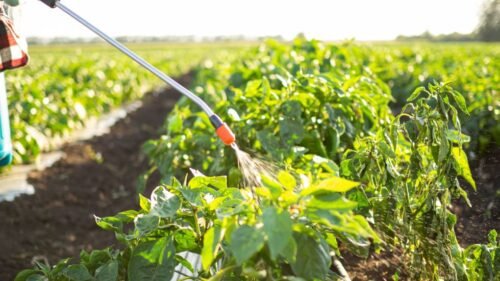On June 8, France passed the Duplomb law that reauthorized the limited use of acetamiprid, a pesticide it had banned in 2018. Environmental advocates were quick to react. Some warned it would endanger bees and induce breast cancer in humans. Others called it a step backward for sustainability.
Over a million people signed a petition urging repeal. It was successful — France’s highest court, the Constitutional Court, struck down the Duplomb law on the basis of environmental concern. But while the concern is real, the story is more complicated.
The Duplomb Law was a step in the right direction
The Duplomb Law doesn’t open the floodgates. It permits temporary, closely monitored use of acetamiprid in areas where no effective alternatives exist. In addition, it would also be subject to review by ANSES, France’s independent food safety agency. If implemented as intended, this is a precaution, not a blanket return to chemical agriculture.
Rather, the law reflects the difficult choices modern governments face as they attempt to simultaneously safeguard food security, rural livelihoods and environmental health. If implemented transparently and carefully, the Duplomb Law could serve as a model for science-informed, balanced regulation. This is especially important in an era when climate change and ecological fragility demand not ideological purity, but evidence-based pragmatism.
So, let’s start with the facts.
Acetamiprid, unlike other neonicotinoid insecticides such as imidacloprid and clothianidin, is generally considered less harmful to bees and poses relatively low environmental risk when used under proper guidelines. The European Food Safety Authority still allows its use across the European Union. Yet France, in 2018, went further by banning all neonicotinoids preemptively. The ban was largely in response to public concern about pollinators.
That concern is valid. The role of pollinators in agriculture and biodiversity is critical. But treating all neonicotinoids as equally dangerous is scientifically inaccurate. Not all pesticides are the same. Policy must differentiate based on actual risk, not chemical class alone or emotional response.
Inflexible bans yield losses, too
Still, we must be clear-eyed: even lower-risk pesticides carry costs. Acetamiprid can accumulate in soil and water and affect beneficial insects. Over-reliance on any chemical can lead to resistance and undermine long-term sustainability.
But the costs of inflexible bans are real, too. Bans such as the one France has passed yield losses such as food insecurity, farmer distress and increased use of black-market or unregulated chemicals. Meanwhile, French farmers, especially beet and fruit growers, are under pressure. As climate change fuels warmer winters and shifts in pest patterns, outbreaks of whiteflies and aphids — many of which spread crop-killing viruses — are becoming increasingly difficult to control. Some farmers report losing 30% to 40% of their harvests.
Alternative methods like organic farming or integrated pest management (IPM) are essential for the future. But in many areas, they are not yet viable at scale, particularly in the face of acute pest infestations. Farmers need immediate, regulated tools to prevent ruin, not inactionable promises.
A pesticide policy that protects pollinators but collapses farm incomes is not sustainable. Nor is one that boosts yields but poisons ecosystems. What we need is a framework that accounts for all these trade-offs — a One Health approach that links human, animal and environmental health.
France needs to consider empirical evidence in its policymaking
Here’s how France and other nations can get this right:
Governments need to base every policy reauthorization on transparent, evidence-based, peer-reviewed science. Let risk assessments be public, replicable and insulated from political pressure.
There needs to be limits on approvals according to time and geography. Emergency uses should expire unless re-evaluated and monitored through real-time tracking of pesticide residue levels and their impacts on ecosystems.
States must invest urgently in alternatives. Governments must fund research into biopesticides, pest-resistant crops and agroecological practices that can actually scale.
France is not the only country facing this dilemma. Around the world, farmers and policymakers are confronting climate-driven disruptions, rising input costs and ecological collapse. These are not times for simplistic answers.
We need policies that recognize the complexity of modern agriculture and are guided by science, not sentiment. The Duplomb Law, while controversial, offered an opportunity to show how evidence-based governance can rise above ideological divides.
[Cheyenne Torres edited this piece.]
The views expressed in this article are the author’s own and do not necessarily reflect Fair Observer’s editorial policy.
Support Fair Observer
We rely on your support for our independence, diversity and quality.
For more than 10 years, Fair Observer has been free, fair and independent. No billionaire owns us, no advertisers control us. We are a reader-supported nonprofit. Unlike many other publications, we keep our content free for readers regardless of where they live or whether they can afford to pay. We have no paywalls and no ads.
In the post-truth era of fake news, echo chambers and filter bubbles, we publish a plurality of perspectives from around the world. Anyone can publish with us, but everyone goes through a rigorous editorial process. So, you get fact-checked, well-reasoned content instead of noise.
We publish 3,000+ voices from 90+ countries. We also conduct education and training programs
on subjects ranging from digital media and journalism to writing and critical thinking. This
doesn’t come cheap. Servers, editors, trainers and web developers cost
money.
Please consider supporting us on a regular basis as a recurring donor or a
sustaining member.
Will you support FO’s journalism?
We rely on your support for our independence, diversity and quality.









Comment